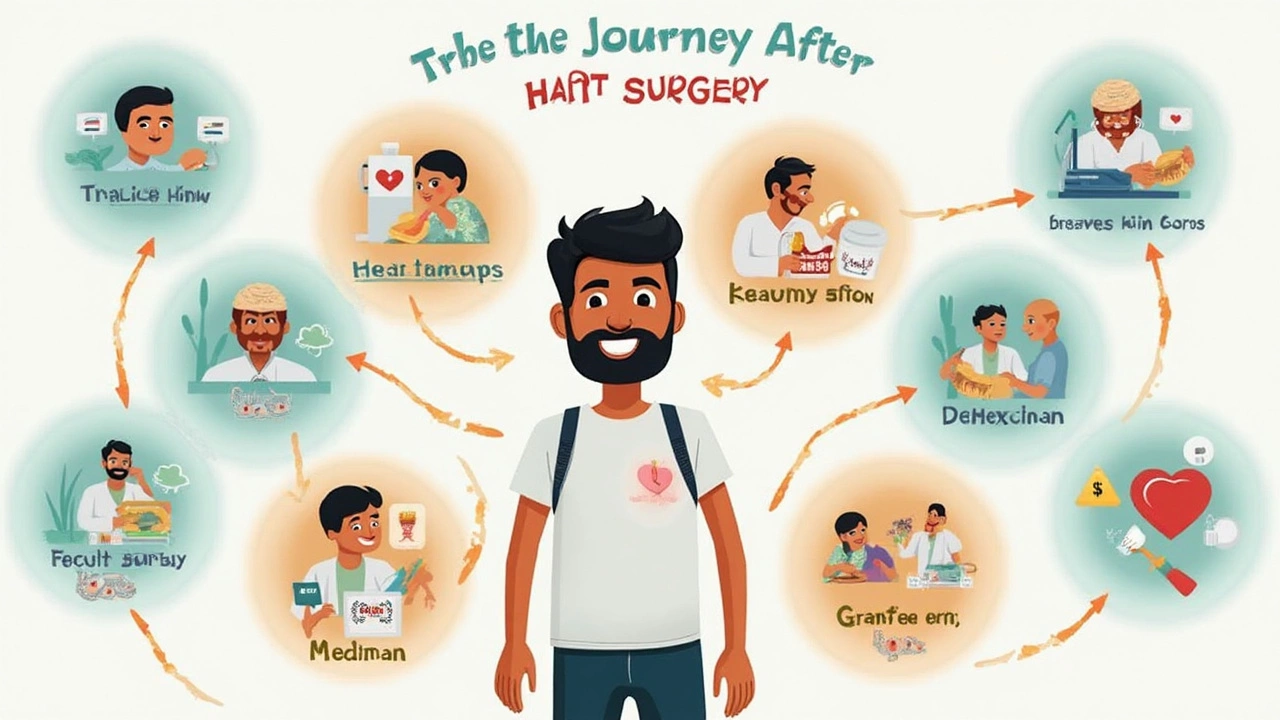If you've just found out you—or someone close to you—needs heart surgery, your mind probably jumps straight to the big question: how much time does this actually buy you? That's not just curiosity, that's survival mode kicking in.
The idea that heart surgery is a reset button is a bit off. Sure, it can add years, sometimes even decades, to your life. But it's not a magic fix. How long you live afterwards depends on what kind of surgery you get, your age, your health before the operation, and what you do when you're back home. For example, folks in their 60s and 70s who get bypass surgery often get another 10 to 15 years, sometimes even more. But it's a team effort—your attitude and choices matter just as much as the doctor's skills in the OR.
Not everybody faces the same odds. If you smoke, have diabetes, or high blood pressure, the numbers shift. But that's not to scare you. With the right info and some smart changes, you're not just surviving—you’re giving yourself a real shot at a longer, better life.
- Does Heart Surgery Change Your Life Span?
- Factors That Affect Survival After Surgery
- Typical Life Expectancy by Procedure Type
- What You Can Do for a Longer, Healthier Life
- Real Stories: Life After Heart Surgery
Does Heart Surgery Change Your Life Span?
The short answer? Yes, heart surgery can absolutely add years to your life, especially if you’re dealing with blocked arteries or a busted heart valve. But how much your clock gets reset depends on a few things—what was fixed, your age, and what your health looked like before you rolled into the operating room.
Think about it like this: if you had triple bypass surgery, you might add anywhere from 5 to 15 years, compared to what would’ve happened if you did nothing. Valve replacements also pack a punch—folks in their mid-60s, for example, can see survival rates pretty close to people without heart issues at all, at least for the first 8 to 10 years.
Doctors have kept tabs on people after different kinds of heart surgery, so there’s some cold, hard data available. Here’s a handy table to show survival rates for some of the most common procedures:
| Type of Surgery | 5-Year Survival Rate | 10-Year Survival Rate |
|---|---|---|
| Coronary Artery Bypass (CABG) | 85-90% | 75-80% |
| Aortic Valve Replacement | 80-88% | 60-75% |
| Mitral Valve Repair | 86-90% | 70-78% |
The numbers show a huge jump in life expectancy. But keep one thing in mind: the biggest boost happens if you don’t wait until the last minute. People who get surgery before their heart takes a big hit usually bounce back better and live longer. So if your doc says you need it, dragging your feet doesn’t help.
Here are a few key facts no one tells you at first:
- Success rates for most major heart surgeries have gone up over the last 30 years. A heart bypass surgery used to be risky in the 1980s, but now, over 95% walk out of the hospital.
- If you’re over 80, you can still get years added to your life—age isn’t an automatic no.
- Feeling better after surgery (energy, breath, mood) often pops up right away, not just years down the road.
So bottom line: if you need heart surgery and you’re cleared for the procedure, you’ll probably gain time and life quality, not just years on a calendar.
Factors That Affect Survival After Surgery
So, what really determines how long you live after heart surgery? It's not just about the operation itself—it's your story before and after you get wheeled into the OR. Think of it like building a team: your age, health habits, and other medical issues all help decide how well things go long-term.
Here’s a breakdown of the main things that count:
- Age: Not shocking, right? People in their 40s and 50s tend to recover faster and hang around longer after surgery than those in their late 70s or 80s. That said, plenty of older folks get great results—age isn’t a brick wall.
- Existing Health Conditions: Diabetes, high blood pressure, kidney disease, and obesity all impact your recovery. For example, people with diabetes have higher odds of complications or another heart problem popping up later.
- Lifestyle Choices: If you quit smoking, exercise even just a little, and eat halfway decent, the odds swing in your favor. People who keep up with cardiac rehab usually live longer and feel better.
- Type of Heart Surgery: There’s more than one kind. Bypass? Valve replacement? Aortic surgery? The risks and life expectancy numbers are different for each type. Surgeons often explain it like this: 'The bigger the job, the bigger the risk.'
- How Sick You Were Before Surgery: Emergency surgeries or ones you have after a heart attack come with more risk than planned, scheduled procedures.
Here’s a quick look at some numbers doctors use to explain how these factors play out. The table takes into account common heart surgeries and key risks:
| Factor | Impact on Life Expectancy |
|---|---|
| Age 60-69 (No major health issues) | 10-15 more years is common |
| Diabetes (any age) | Reduces odds by 20-30% compared to non-diabetics |
| Quit smoking after surgery | Cuts risk of death by 36% over next 5 years |
| Attending cardiac rehab | Adds 2-3 years on average, plus better quality of life |
| Emergency surgery (after heart attack) | First-year risk of complications nearly doubles |
The take-home? There’s a lot you can’t control, like age or family history. But things like quitting smoking, showing up for rehab, and managing blood pressure are totally in your court. Stacking the odds in your favor really comes down to making small changes and sticking to them.

Typical Life Expectancy by Procedure Type
Not all heart surgeries come with the same odds, and it helps to know what to expect for each type. Let's break down the stats for the most common surgeries so you have a real sense of what life may look like after the operation.
Heart surgery, like coronary artery bypass grafting (CABG), is one of the most common. For people in their 60s or early 70s, it's normal to see 10 to 20 more years of life after a successful bypass, with many folks reaching their 80s or beyond. That said, if you go into surgery with other health problems—like diabetes or severe kidney issues—you might be looking at a shorter runway. A big study in The Annals of Thoracic Surgery showed that, on average, CABG patients lived nearly as long after surgery as people the same age who never had heart disease.
Valve replacement is another frequent one, especially among older adults. Mechanical valves can last the rest of your life, but require taking blood thinners; tissue valves typically last 10 to 20 years. Most people see about 10 to 15 years of added life, sometimes more if the rest of their health is on track.
Less invasive options, like stenting or angioplasty, work well for blocked arteries. These aren't really "open heart" surgeries, but they’re often compared since they treat similar problems. Studies show that patients can gain at least 5-10 years when problems are caught early and managed properly.
If you need multiple procedures—like both a bypass and a valve replacement—the numbers can drop a bit, with average extra years somewhere in the 7-12 range after surgery, depending on age and health status.
- Coronary artery bypass (CABG): 10–20 years added lifespan for healthy people, often aligns with normal aging.
- Valve replacement: 10–15 years for most; may be longer with fewer health risks.
- Stenting/angioplasty: Up to 10 years if other problems don’t pop up.
- Combined surgeries: Average 7–12 more years, highly individual.
Doctors aren’t psychics, and averages are just that—averages. But these numbers give you a ballpark, not wishful thinking. If you want your odds to be on the longer side, what you do after heading home really matters, from taking meds to eating better and sticking with follow-ups.
What You Can Do for a Longer, Healthier Life
You want extra years after heart surgery? It’s not just about the operation itself. What really counts is what you do next. The American Heart Association says people who make smart changes after surgery can cut their risk of another heart event by about 50%. That's not a small number.
So, what really works?
- Heart surgery isn't the finish line—it's the starting block. Top of the list: take your meds the way your doctor tells you. Skipping doses or stopping early is a fast track back to the hospital.
- Get moving. Daily walks, swimming, or joining a rehab program make a huge difference. One big study from Cleveland Clinic showed that regular exercise shaved down the risk of dying by almost 30% after bypass surgery.
- Eat for your heart. Loads of vegetables, fruits, whole grains, and lean proteins—think Mediterranean-style. Go easy on salt and saturated fats. Even swapping out just one sugary drink a day can help your blood pressure stay in check.
- If you smoke, quitting is non-negotiable. The proof is strong: people who quit after heart surgery live years longer than those who don’t. If you need support, don’t try to tough it out alone—ask your doctor for help.
- Watch your numbers. Keep your blood pressure, cholesterol, and blood sugar where your doc wants them. That means regular check-ups, not just when you feel cranky.
- Don’t ghost your appointments. Cardiac rehab isn’t just exercise—it’s education, support, and supervised progress so you gain confidence and catch problems early.
- Stress hits your heart, too, but even simple things like deep breathing, talking with friends, or getting out in nature can keep it in check.
All these changes add up. You can’t control everything, but these are things you can do today that have a real, proven impact on how long and how well you live after surgery.

Real Stories: Life After Heart Surgery
Talking to people who’ve gone through heart surgery gives a reality check you can’t get from just numbers. Take Ajay, a retired teacher from Delhi, who had bypass surgery at 68. He was back on his morning walks in under three months and jokes that he feels more energetic now than before his operation. His biggest tip? Stick to the rehab plan and never skip follow-up appointments.
Another common story comes from people who've had valve replacements. Rupal, a 55-year-old working mom, was back at her job within 10 weeks after getting a mechanical valve. She admits there’s medication to take for life, but says it's a small price for getting her old energy back. Her doctors stressed the importance of staying active and monitoring her blood-thinner levels to avoid complications.
Then there are stories where things didn’t go perfectly. Manoj, in his early 70s, had a few setbacks with infections after surgery, but regular checkups and strict hygiene at home helped him bounce back. He learned the hard way how crucial aftercare really is.
If there’s one thing that stands out from all these stories, it’s this: heart surgery isn’t the end—it's often the start of a much better chapter, as long as you play your part. People talk about changes they made after surgery that made all the difference, like:
- Joining a cardiac rehab group for regular exercise and support
- Cutting out smoking, and keeping an eye on blood pressure and sugar
- Taking medicines right on the dot, never skipping doses
- Building a simple but steady routine of checkups and tests
Plenty of folks say they thought they'd never feel "normal" again, but with effort, support, and honest talks with their doctors, they often do more than just go back to normal—they create a new normal that feels even stronger.





